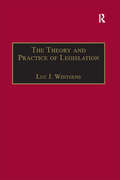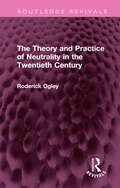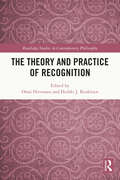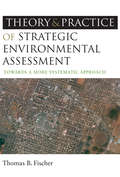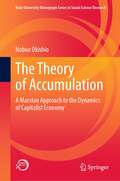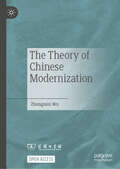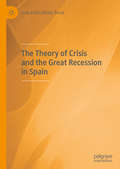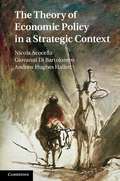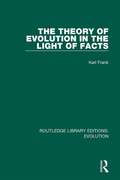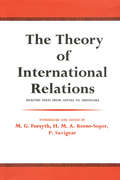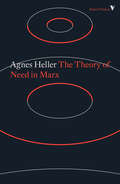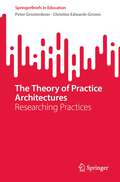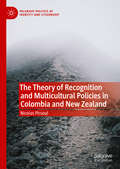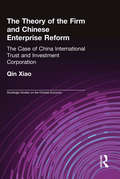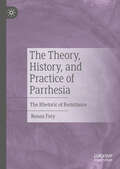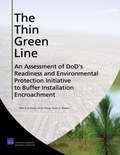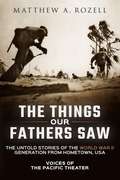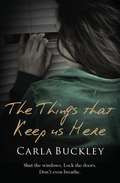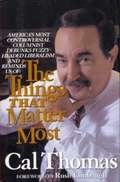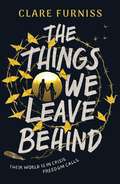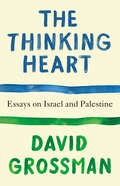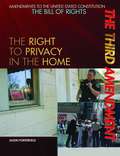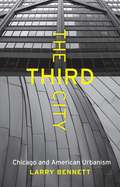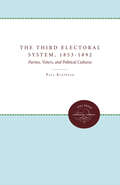- Table View
- List View
The Theory and Practice of Legislation: Essays in Legisprudence (Applied Legal Philosophy)
by Luc J. WintgensThis work provides a rational framework for legislation. The unifying premise behind the essays is that, although legislation and regulation are the result of a political process, legislation and regulation can be the object of theoretical study. The volume focuses on problems that are common to most European legal systems and the approach involves applying to legislative problems the tools of legal theory - hence 'legisprudence'. Whereas traditional legal theory deals predominantly with the application of law by the judge, legisprudence enlarges the field of study so as to include the creation of law by the legislator. The original essays published in this collection expose and develop a range of new insights into the relationship between legislative problems and legal theory in a way which will engage and interest legal scholars throughout the world.
The Theory and Practice of Neutrality in the Twentieth Century (Routledge Revivals)
by Roderick OgleyOriginally published in 1970 The Theory and Practice of Neutrality in the Twentieth Century documents the various shapes and forms that neutrality has taken. The most important are neutralization, traditional neutrality, ad hoc neutrality and non-alignment. Each of these terms is carefully defined and illustrated by documents running from the beginning of this century to the late 1960s. This enables students to judge for themselves whether neutrality can again become, as it was in the past, an honourable convenience, or whether, except in so far as it contributes to mediation and peacekeeping, it is an anachronism.
The Theory and Practice of Recognition (Routledge Studies in Contemporary Philosophy)
by Heikki J. Koskinen Onni HirvonenThis volume presents new essays on the theory and practice of recognition. In order to retain its overall plausibility as a critical social theory, contemporary recognition theory needs to be able to successfully combine theory with real-life perspectives, in both contemporary and historical contexts. Contemporary recognition theory has developed into an established and active multidisciplinary research programme. The chapters in this volume have two main purposes. First, they engage in theoretical development of the contemporary theories of recognition. They explore the conceptual histories and the environments of recognition, as well as the connection between recognition and authenticity, emancipation, and social ontology. Second, they connect the theoretical insights of contemporary recognition with analyses of contemporary and historical social practices. These contributions explore themes such as populism and polarization, models of harmful invisibilization and social ignorance, the problem of evil and suffering, and social justice phenomena such as the #MeToo movement. The Theory and Practice of Recognition will be of interest to scholars and advanced students working in social and political philosophy, social ontology, political theory, and sociology.
The Theory and Practice of Recognition (Routledge Studies in Contemporary Philosophy)
by Heikki J. Koskinen Onni HirvonenThis volume presents new essays on the theory and practice of recognition. In order to retain its overall plausibility as a critical social theory, contemporary recognition theory needs to be able to successfully combine theory with real-life perspectives, in both contemporary and historical contexts.Contemporary recognition theory has developed into an established and active multidisciplinary research programme. The chapters in this volume have two main purposes. First, they engage in theoretical development of the contemporary theories of recognition. They explore the conceptual histories and the environments of recognition, as well as the connection between recognition and authenticity, emancipation, and social ontology. Second, they connect the theoretical insights of contemporary recognition with analyses of contemporary and historical social practices. These contributions explore themes such as populism and polarization, models of harmful invisibilization and social ignorance, the problem of evil and suffering, and social justice phenomena such as the #MeToo movement.The Theory and Practice of Recognition will be of interest to scholars and advanced students working in social and political philosophy, social ontology, political theory, and sociology.
The Theory and Practice of Strategic Environmental Assessment: Towards a More Systematic Approach
by Thomas B Fischer?Anyone serious about integrating environmental factors into planning and policy making will gain new insights and ideas from Fischer?s book on SEA; and students, teachers and practitioners of the subject will find the book essential.? Leonard Ortolano, Professor at Stanford University, USA ?Fischer?s book demystifies the process and substantive analytical dimensions of SEA. Offering solidly documented empirical evidence of the value of SEA to development, the knowledge captured in this book is a great contribution to the practice.? Linda Ghanime, Environmental Operations and Policy Adviser, United Nations Development Program ?This book is an invaluable reference text for SEA practitioners. I recommend it to everyone!? Xu He, Professor and Director of the Strategic Environmental Assessment Center at Nankai University, China ?Fischer gives a concise and wellstructured account of SEA as it is used today. Readers thus will gain important insights into SEA: why it is important, how it works, and what it can and should achieve.? Professor Thomas Bunge, Federal Environment Agency, Germany Strategic Environmental Assessment (SEA) is a fast-growing and rapidly evolving professional field driven by both advances in theory and practice and by regulatory requirements in Europe, North America, Australasia, South Africa and increasingly across Asia. However, to date, analysis of existing practice and associated reporting has remained far from systematic and there has been a clear need for a comprehensive textbook to facilitate teaching, learning and practice in this burgeoning field. This textbook, the first of its kind, provides for a state-ofthe-art review of SEA theory and practice and promotes a more systematic approach to SEA. It is written for a wide student, professional and academic audience and aims particularly at supporting the development of SEA modules in undergraduate and postgraduate planning, environmental assessment, engineering and law courses. It provides an overview of the fundamental principles and rules of SEA, reports systematically on international SEA practice and theory and pushes the envelope by developing the theory. Supporting material includes boxed examples and case studies from around the world, extra reading suggestions and a glossary of terms. This is the essential book for all students, professionals and academics in SEA and EIA and follow-up worldwide.
The Theory of Accumulation: A Marxian Approach to the Dynamics of Capitalist Economy (Kobe University Monograph Series in Social Science Research)
by Nobuo OkishioThis book treats the mechanisms of growth and cycles in capitalist economies in a unified manner, incorporating a highly original macro-dynamic theory based on Marxian micro-foundations and historical perspectives. That theory was developed about 50 years ago by Nobuo Okishio (1927–2003) and included the ideas of Keynes and Harrod. In mainstream economics, it used to be standard to analyse long-term economic growth and business cycles in different frameworks. That approach has been changing recently, but it still tends to be common to discuss them separately. At the outbreak of the global financial crisis of 2007–2008 and the prolonged stagnation that followed, there was strong criticism among policymakers and businesspeople that mainstream macroeconomics failed to provide convincing explanations and effective policy recommendations. This book offers an alternative perspective that responds to those criticisms. All these macroeconomic difficulties call for new wisdom beyond the limited neoclassical framework. The sharp, wise thoughts of Okishio will add new tools for young researchers worldwide to meet the challenges of the current resource misallocation, the Great Recession and the Lost Decades problems. Okishio proposes a historical perspective for the capitalist system, first. He argues that production relations are conditioned by productive force. The former should evolve as the latter improves, and the latter should evolve in order for human society to survive. While reproduction is indispensable for the economy to continue in any production relations, it takes a specific form in capitalist economy. He next shows that the existence of profit requires the exploitation of the labourer. This is called the Fundamental Marxian Theorem. He also shows a trade-off relationship between the real wage rate and the profit rate. In his theory, the real wage rate is determined to clear commodity markets in the short run as in the Keynesian theory, while Marx believed that the real wage rate is given at subsistence level or is influenced by the labour market. Okishio attributes the origin of the business cycle to labourers’ under-consumption and private capitalists’ dispersive decision of accumulation. The former is caused by exploitation, and the latter is based on the capitalist class’s private ownership of the means of production. Both are derived from the nature of the capitalist economy. He argues lastly that, in the long term, the development of productive force through the business cycle will transform the production relation into a new economic system.
The Theory of Chinese Modernization
by Zhongmin WuThis open access book explores China's unique path to modernization, highlighting its journey from ancient civilization to modern society. It examines China's efforts from the mid-19th century's internal and external struggles to its contemporary economic achievements. The book covers historical, social, and economic aspects, emphasizing the balance between autonomous development and global integration. It explains how China has adapted and refined its modernization principles over time. The book is ideal for academics, researchers, and students in sociology, political science, and economics, as well as policymakers and professionals in international development. The content is accessible yet detailed, catering to both new and seasoned scholars. With insightful analysis and practical implications, the book is a significant contribution to the study of modernization and social development.
The Theory of Crisis and the Great Recession in Spain
by Juan Pablo Mateo ToméThis book has a dual purpose. First, it analyses the concept of economic crises within economic theory, showing the various theoretical foundations and controversies amongst different schools of economic thought. Second, it presents an empirical analysis of the Great Recession in Spain, addressing the growth period of 1995 to 2007-08, the subsequent depression until 2013-14 and the recovery that followed. It also shows the way in which the inner contradictions of capital manifests itself in an European peripheral economy under a real estate bubble, emphasizing the role of the Spanish economy in European capitalism.This theoretical and empirical heterodox approach will be of interest to students and scholars in political economy, and those with an interest in the Eurozone.
The Theory of Economic Policy in a Strategic Context
by Giovanni Di Bartolomeo Nicola Acocella Andrew Hughes HallettIn developing a new and highly innovative theory of economic policy, this book deals with conflicts between strategic actions by public and private agents. It builds on the Lucas critique but also applies the tools introduced by Tinbergen and Theil to dynamic policy games and from there derives a new theory of economic policy. Its main propositions describe such properties in the models currently used for policy-making as neutrality and equilibrium existence, uniqueness, and multiplicity. These properties are key to understanding the impact of concepts such as rational expectations, time inconsistency, communication and the use of policy announcements. As the numerous examples show, they are useful both for model building and for devising optimal institutions. The Theory of Economic Policy in a Strategic Context is an essential but accessible tool for economic researchers involved in policy questions.
The Theory of Evolution in the Light of Facts (Routledge Library Editions: Evolution #3)
by Charles T. DrueryOriginally published in 1913, The Theory of Evolution in the Light of Facts examines the theory of Descent; the book is a time capsule of information, providing a record of the explorations into Darwinian theory during the first half of the 20th century. The book examines the contradictions which arose between technical work of the period and the assumptions surrounding the theory of evolution. The book aims to address that which is considered ‘certain’ or ‘probable’ from postulation in order to explain and clearly define the theory of evolution. It does this through hypothesising on the development of animals and plants using the systems of Darwin and Lamarck. This book will be of interest to anthropologists and historians of natural science alike.
The Theory of International Relations: Selected Texts from Gentili to Treitschke
by Friedrich LutzThe great writings of the past on the subject of international relations add an important dimension to the contemporary study of the field. The Theory of International Relations consists of substantial selections from authors whose ideas should be readily available to all students of international relations. All the passages selected by the editors ask fundamental, theoretical questions searching for the essence of interstate relations. This quest for answers carries the reader into investigations of the causes of war, the balance of power, the relationship between international relations and the political theory of the state, and other major issues of this subject.The editors provide an introduction to the work, which sets out the principles of selection and their belief in the relevance of political thought to the understanding of international relations. The selections are arranged in chronological sequence from Alberico Gentili, writing in 1598, to Heinrich von Treitschke, lecturing in Berlin at the end of the nineteenth century. All are concerned with the nature of international politics. Some of these selections are translated here for the first time and others reprinted from translations not easily obtainable. It is significant that Gentz's essay on the balance of power has not appeared in English since 1806, while Rousseau's writings on international politics have never been fully translated at all.There can be little doubt that the great writers of the past are presently neglected by students of international relations. This work covers extensive ground in solving this problem. As the theoretical background of international relations is acquiring an increasingly important place in college courses in this area, the need for this book is widely felt.
The Theory of Need in Marx (Radical Thinkers)
by Ken Coates Agnes Heller Stephen BodingtonThe first full presentation of a fundamental aspect of Marx, the concept of needWhat are needs? While the edifices of economic theory are built upon various mechanisms designed to satisfy “human needs,” not many economists have addressed the idea of need itself. Heller’s highly original work identifies this lacuna, recognizing the concept of needs as playing a “hidden but principal role in Marx’s economic categories.” Her writing lucidly exposes radical needs as bearing the seeds of revolutionary agency in alienated capitalist society, and reasserts our existence as sentient beings beyond the realm of the material, productive spheres.
The Theory of Practice Architectures: Researching Practices (SpringerBriefs in Education)
by Peter Grootenboer Christine Edwards-GrovesThis book provides an overview of the Theory of Practice Architectures (TPA), and the associated Theory of Ecology of Practices, in a manner accessible for a broader audience. The authors are part of the authorial team that developed the Theory of Practice Architectures from a strong empirical base, with its initial publication in 'Changing Practices, Changing Education' (Kemmis et al., Springer, 2014). This book follows on from that publication with a singluar focus on the Theory of Practice Architectures, and shows how it can be used as a theoretical framework for a range of empirical research projects. It first outlines and describes both the Theory of Practice Architectures and the Theory of Ecology of Practices, illustrating them with a range of relevant practical examples. Then, it focuses explicitly on designing and undertaking empirical research, analyzing data and reporting findings using the Theory of Practice Architectures. In this way, this book shows specifically and overtly explicate ways that research can be designed, and how data can be collected and analyzed, drawing on the Theory of Practice Architectures as a foundational framework. It also showcases a range of specific examples to allow readers to see the ideas as they have been employed in practice.
The Theory of Recognition and Multicultural Policies in Colombia and New Zealand (Palgrave Politics of Identity and Citizenship Series)
by Nicolas PirsoulThis book analyses the policies of recognition that were developed and implemented to improve the autonomy and socio-economic well-being of Māori in New Zealand and of indigenous and Afro-descendent people in Colombia. It offers a theoretically informed explanation of the reasons why these policies have not yielded the expected results, and offers solutions to mitigate the shortcomings of policies of recognition in both countries. This in-depth analysis enables readers to develop their understanding of the theory of recognition and how it can promote social justice.
The Theory of the Firm and Chinese Enterprise Reform: The Case of China International Trust and Investment Corporation (Routledge Studies on the Chinese Economy #Vol. 10)
by Xiao QinChanges to corporate structure, including the role of the corporate headquarters, have been key factors in bringing about economic reform in China. In this penetrating and insightful book, Xiao questions the conventional theory of the firm, arguing that the ultimate goal of the headquarters of modern large corporations is to function as a substitute for the market, and introducing a new explanation for the nature of the firm - the 'substitution function model'. He provides an insider's account of the reforms in CITIC, a rare narrative that should be essential reading for scholars and practitioners who care about the theory and practice of the firm, in particular in the context of Chinese enterprise reform.
The Theory, History, and Practice of Parrhesia: The Rhetoric of Resistance
by Renea FreyThis book examines the theory, history, and practice of parrhesia—the act of speaking truth to power, when doing so is risky for the rhetor—and argues for a networked rhetorical approach to parrhesia that has not been considered previously by any other theorist. The goal of this book is to offer a reader-friendly explanation of this networked rhetorical approach to parrhesia, provide a genealogical account of the origins of parrhesia in the Classical age, and to show how parrhesia manifests today. This book is meant to give readers a functional manual for understanding, recognizing, analyzing, articulating, and using parrhesia.
The Thin Green Line
by Anny Wong Beth E. Lachman Susan A. ResetarThis monograph assesses the effectiveness of DoD's Readiness and Environmental Protection Initiative to help testing and training installations deal with encroachment from sprawl and other sources. The authors identify the main causes of encroachment; detail the benefits, both to the military and local communities, of buffering areas near installations with REPI projects; and provide recommendations for how to improve REPI's effectiveness.
The Things Our Fathers Saw: Voices of the Pacific Theater
by Matthew A. RozellThis book brings you the previously untold firsthand accounts of combat and brotherhood, of captivity and redemption, and the aftermath of a war that left no American community unscathed.
The Things That Keep Us Here: HOW DO YOU PROTECT YOUR FAMILY DURING A NATIONWIDE PANDEMIC?
by Carla BuckleyHOW DO YOU PROTECT YOUR FAMILY DURING A NATIONWIDE PANDEMIC?'The story of the Brooks family as they face a nationwide pandemic and fight to survive ... what an amazing read' Amazon reviewer 5 starsMillions are dead. Fear and panic have gripped the nation. An engrossing and emotionally gripping story of one family whose limits are tested to the extreme.It began with a dead bird. Then state-wide school closure. Before long, the whole town is in lockdown and the Brooks family are quarantined in their own home - with a faceless enemy on their doorstep.They must cope as best they can, battling hunger, cold and boredom. But as the threat inches closer, and neighbour turns against neighbour, single mother Ann doesn't know who she can trust - including those taking refuge in her house.With no end in sight, Ann knows that if she is to protect her daughters from untold danger, she must make impossible decisions in order to survive...
The Things That Matter Most
by Cal ThomasIn this controversial and thought-provoking bestseller that has sold more than 125,000 copies, America's fastest-growing syndicated columnist explains how we have lost sight of the things that matter most.
The Things We Leave Behind
by Clare FurnissHow I Live Now meets Exodus – a startling YA dystopia that imagines London as the epicentre of the refugee crisis, from critically acclaimed author Clare Furniss. Civil unrest in London has reached an all-time high after years of a growing authoritarian regime, and it&’s no longer safe for Clem and her half-sister Billie in the city. Clem tells of their treacherous journey to Scotland, by road and then by sea, fleeing with nothing but a notebook filled with stories and memories of home. But is there something Clem's not saying? And how will this journey – and the sisters&’ story – end? With the start of a new life? Or a mirror held up to the past?PRAISE FOR THE THINGS WE LEAVE BEHIND: &‘A frighteningly remarkable, relevant and moving novel, told gently and with impeccable style. Clare Furniss is one of the very best writers for young people and this new novel is her finest yet. I loved it.&’ Sarah Crossan, author of Moonrise 'Gripping and heart-wrenching, the story has a tragic denouement that is almost too painful to read, but Furniss&’ exquisite writing carries the reader through.' The Bookseller I couldn't stop reading The Things We Leave Behind, I was totally immersed, as if I was a book-mad teenager again. I was moved and engrossed. Devastating and unsparing but full of hope and love too. It was a privilege to read it. - Candy Gourlay This book is exceptional. Years and Years meets The End We Start From for teenagers. Should be on every secondary set text list. - Joanna Nadin SO good - gripping, moving, tense, twisty and very, very necessary. In Clare&’s capable hands it all felt so utterly real and terrifyingly possible I got the chills. - Lisa Williamson Such moving, thought-provoking, compelling story-telling. Wonderful characters. Utterly convincing. I loved it. - Julia GreenPRAISE FOR CLARE FURNISS: &‘Lingers in the mind long after the final word has been read&’ Malorie Blackman, author of Noughts & Crosses &‘Absolutely gorgeous, heartfelt and incredibly enjoyable&’ Robin Stevens, author of the Murder Most Unladylike series &‘Funny, sharply observed, shocking and wonderful&’ Sunday Times &‘A beautifully executed story . . . gloriously funny, deeply emotional and a triumph&’ Daily Mail &‘Beautifully written&’ StylistPRAISE FOR CLARE FURNISS: &‘Lingers in the mind long after the final word has been read&’ Malorie Blackman, author of Noughts & Crosses &‘Absolutely gorgeous, heartfelt and incredibly enjoyable&’ Robin Stevens, author of the Murder Most Unladylike series &‘Funny, sharply observed, shocking and wonderful&’ Sunday Times &‘A beautifully executed story . . . gloriously funny, deeply emotional and a triumph&’ Daily Mail &‘Beautifully written&’ Stylist
The Thinking Heart: Essays on Israel and Palestine (Vintage International)
by David GrossmanSearing essays from International Booker Prize-winning Israeli author and long-time peace activist David Grossman carry us up to and through the cataclysm of Oct 7th and what followedWe know David Grossman's voice of ringing moral clarity from way back: since the late 1980s and The Yellow Wind, his classic work on the urgency of the two-state solution and the price paid by both occupier and occupied, he has been criticizing his country's government and pushing for paths to a lasting peace. Just after October 7th, 2023, he retreated inwards to ask himself anew these difficult and necessary questions about his beloved nation:How could this massacre have happened?How could the Netanyahu government, tangled in its web of scandals, have failed to protect its citizens?And did October 7 and the war that followed take with it the last hope of a two-state solution?In these eleven essays, which appeared in newspapers and journals at key moments when Grossman wanted to hold the government to account, he traces the failures leading up to that day and the ensuing war, enabled and abetted by a morally bankrupt party clinging to power. He documents the struggle being fought on both sides between those committed to conflict, and the many who want to live in peace and equality with their neighbors.He asks what the meaning and purpose of a Jewish state can be, when the core values of Judaism, with its reverence for the dignity of each human life, are cast aside, and how his people, so accustomed throughout history to being in the minority, have not proved able to exist as a majority with the dignity and humanity that the job demands. Ultimately, Grossman arrives at the most important question of all: Will there ever be a lasting peace in the region?
The Third Amendment: Upholding The Right To Privacy (Amendments To The United States Constitution: The Bill Of Rights)
by Jason PorterfieldThe Third Amendment guarantees that soldiers cannot be quartered with U.S. citizens during times of peace. At the time of its passage, this amendment made a significant difference in the lives of American citizens. It formed a separation between Americas military and its civilians. Although seldom cited today in court cases, the Third Amendments impact has been long lasting, and has given rise to military bases all over the country. This book richly explores the amendment and its history. Fascinating sidebars and photographs support the text.
The Third City: Chicago and American Urbanism (Chicago Visions And Revisions Ser.)
by Larry BennettOur traditional image of Chicago—as a gritty metropolis carved into ethnically defined enclaves where the game of machine politics overshadows its ends—is such a powerful shaper of the city’s identity that many of its closest observers fail to notice that a new Chicago has emerged over the past two decades. Larry Bennett here tackles some of our more commonly held ideas about the Windy City—inherited from such icons as Theodore Dreiser, Carl Sandburg, Daniel Burnham, Robert Park, Sara Paretsky, and Mike Royko—with the goal of better understanding Chicago as it is now: the third city. Bennett calls contemporary Chicago the third city to distinguish it from its two predecessors: the first city, a sprawling industrial center whose historical arc ran from the Civil War to the Great Depression; and the second city, the Rustbelt exemplar of the period from around 1950 to 1990. The third city features a dramatically revitalized urban core, a shifting population mix that includes new immigrant streams, and a growing number of middle-class professionals working in new economy sectors. It is also a city utterly transformed by the top-to-bottom reconstruction of public housing developments and the ambitious provision of public works like Millennium Park. It is, according to Bennett, a work in progress spearheaded by Richard M. Daley, a self-consciously innovative mayor whose strategy of neighborhood revitalization and urban renewal is a prototype of city governance for the twenty-first century. The Third City ultimately contends that to understand Chicago under Daley’s charge is to understand what metropolitan life across North America may well look like in the coming decades.
The Third Electoral System, 1853-1892: Parties, Voters, and Political Cultures
by Paul KleppnerThis analysis of the contours and social bases of mass voting behavior in the United States over the course of the third electoral era, from 1853 to 1892, provides a deep and rich understanding of the ways in which ethnoreligious values shaped party combat in the late nineteenth century. It was this uniquely American mode of "political confessionals" that underlay the distinctive characteristics of the era's electoral universe.In its exploration of the the political roles of native and immigrant ethnic and religious groups, this study bridges the gap between political and social history. The detailed analysis of ethnoreligious experiences, values, and beliefs is integrated into an explanation of the relationship between group political subcultures and partisan preferences which wil be of interest to political sociologists, political scientists, and also political and social historians.Unlike other works of this genre, this book is not confined to a single description of the voting patterns of a single state, or of a series of states in one geographic region, but cuts across states and regions, while remaining sensitive to the enormously significant ways in which political and historical context conditioned mass political behavior. The author accomplishes this remarkable fusion by weaving the small patterns evident in detailed case studies into a larger overview of the electoral system. The result is a unified conceptual framework that can be used to understand both American political behavior duing an important era and the general preconditions of social-group political consciousness. Challenging in major ways the liberal-rational assumptions that have dominated political history, the book provides the foundation for a synthesis of party tactics, organizational practices, public rhetoric, and elite and mass behaviors.
